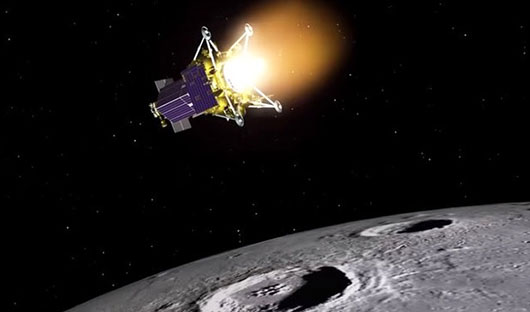Special to CosmicTribune.com, August 22, 2023
By Richard Fisher
On Aug. 19, Russia’s Luna-25 unmanned Moon exploration vehicle crashed into the Moon and was destroyed, dashing what was to be the first element of the China-Russia International Lunar Research Station (ILRS), raising the stakes for China’s unmanned Moon probes to begin to populate the ILRS prior to China’s first manned Moon mission planned for 2029.
Though a “specially formed interdepartmental commission” will investigate the cause of the failure of Luna-25, according to an Aug. 20 statement issued by the Russian space agency Roscosmos, some preliminary causes have been mentioned by Russian sources.

At about 2 p.m. Moscow time, according to Roscosmos, when trying to put the Luna-25 probe into a pre-landing orbit, “an emergency situation occurred on board the automatic station, which did not allow the maneuver to be performed with the specified parameters.”
Then on Aug. 21, Roscosmos head Yuri Borisov noted that a planned engine burn for 84 seconds, to help decelerate the spacecraft, turned into a 127-second burn.
This may have been sufficient to have put Luna-25 into a crash trajectory.
It is now known whether the source of the crash was ultimately a failure of hardware, or mission controlling software; that is one of the charges of the “interdepartmental commission.”
Russian candor, as it is, about the Luna-25 failure, is something that Russians expect from a space program that has experienced its share of success and spectacular failure, to include the loss of Russian Cosmonauts’ lives.
Such Russian candor, however, sets something of a high standard for China, which is often reluctant to even acknowledge, much less explain failures of its space program.
It is likely, however, that as China and Russia populate their International Lunar Research Station (ILRS), it is China that will control the information and messaging should there be spectacular failures.
But indicating its sensitivity to China’s reaction to the Luna-25 failure, on Aug. 21 the Russian state news agency TASS was quick to report the first reaction from the Chinese Foreign Ministry.
TASS noted, “’China is open to international space cooperation for exploring the Moon even following the loss of Russia’s Luna-25 automated lunar lander,’ Chinese Foreign Ministry Spokesman Wang Wenbin said.”
Full Text . . . . Current Edition . . . . Subscription Information

You must be logged in to post a comment Login